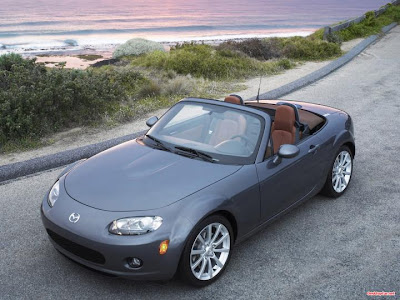Mazda MX5 Cars - From idea to production
The first round of judging the competing designs was held in April 1984. At this stage, designs were presented solely on paper. The mid-engined car appeared the most impressive, although it was known at the time that such a layout would struggle to meet the noise, vibration and harshness (NVH) requirements of the project. It was only at the second round of the competition in August 1984, when full-scale clay models were presented, that the Duo 101 won the competition and was selected as the basis for Mazda's new light-weight sports car.
The Duo 101, so named as either a soft top or hard top could be used, incorporated many key stylistic cues inspired by the Lotus Elan, a 1960s roadster. International Automotive Design (IAD) in Worthing, England was commissioned to develop a running prototype, codenamed V705. It was built with a fiberglass body, a 1.4 L (85 cu in) engine from a Mazda Familia and components from a variety of early Mazda models. The V705 was completed in August 1985 and taken to the U.S.A. where it rolled on the roads around Santa Barbara and got positive reactions.
The project received final approval on 18 January 1986. The model's codename was changed to P729 as it moved into production phase, under head of program Toshihiko Hirai. The task of constructing five engineering mules (more developed prototypes) was again allocated to IAD, which also conducted the first front and rear crash tests on the P729. While Tom Matano, Mark Jordan, Wu Huang Chin and Koichi Hayashi worked on the final design, the project was moved to Japan for engineering and production details.
By 1989, with a definitive model name now chosen, the MX5 (as in "Mazda Experiment", project number 5) was ready to be introduced to the world as a true lightweight sports car, weighing just 940 kg (2,100 lb).
The Duo 101, so named as either a soft top or hard top could be used, incorporated many key stylistic cues inspired by the Lotus Elan, a 1960s roadster. International Automotive Design (IAD) in Worthing, England was commissioned to develop a running prototype, codenamed V705. It was built with a fiberglass body, a 1.4 L (85 cu in) engine from a Mazda Familia and components from a variety of early Mazda models. The V705 was completed in August 1985 and taken to the U.S.A. where it rolled on the roads around Santa Barbara and got positive reactions.
The project received final approval on 18 January 1986. The model's codename was changed to P729 as it moved into production phase, under head of program Toshihiko Hirai. The task of constructing five engineering mules (more developed prototypes) was again allocated to IAD, which also conducted the first front and rear crash tests on the P729. While Tom Matano, Mark Jordan, Wu Huang Chin and Koichi Hayashi worked on the final design, the project was moved to Japan for engineering and production details.
By 1989, with a definitive model name now chosen, the MX5 (as in "Mazda Experiment", project number 5) was ready to be introduced to the world as a true lightweight sports car, weighing just 940 kg (2,100 lb).



